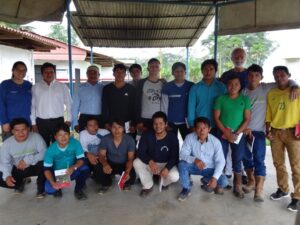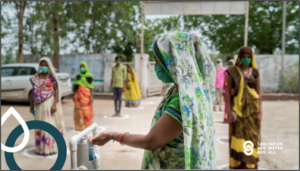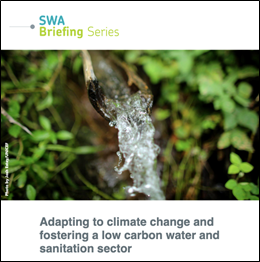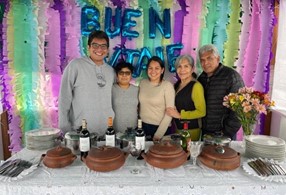From Diana Campos Quiroz: Shaping my Path as a Peacebuilder
Making my dream come true: becoming a liaison for sustainable development
Back in 2016, I experienced a meaningful call to follow my dream to become a peacebuilder. I was in the middle of the Peruvian Amazon, working hand in hand with Awajun, Achuar, and Wampis indigenous communities. That was not the first time I visited them; however that encounter with them was different because I genuinely connected with their needs, worries, and desires in that occasion. Realizing that those people live with contradiction because they live in the world’s most diverse and rich ecosystem that mitigates the global climate crisis. Nevertheless, they still live in extreme poverty and unsafe conditions such as the lack of clean potable water, sanitation, education, health, food, job opportunities, deforestation, and pollution.

I came back home thinking about how I can contribute to reducing inequalities, protecting indigenous human rights and the environment, working cooperatively with the government, private sector, and national and international cooperation. My passion for becoming a game-changer pushed me to grow and learn. I found the Rotary Peace Fellowship (RPF) a window opportunity to build skills, gain knowledge, and learn from others’ experiences to address the most pressing challenges that many developing countries face through a holistic approach. The Master of International Development Policy (MIDP) program at Duke University and the Applied Field Experience (AFE) were the perfect matches I needed to start my path in the development field. The AFE provides a rich, valuable and unique chance to work and learn from the most prestigious organizations in the international development sector. I applied for RPF without hesitation, and it was the best decision that I have ever made.
SWA: WASH for All, Always and Everywhere
I decided to do my AFE at Sanitation and Water for All (SWA) due to my deep interest in reducing the gap of inequality in the WASH sector. The Covid-19 pandemic showed that WASH plays a vital role in reducing the infection rate. However, many countries have insufficient/lack of WASH services provision for their population.
I joined the Country Engagement Team at SWA, which is a global multi-stakeholder partnership hosted by UNICEF. SWA supports governments to increase political will to allocate resources efficiently to increase the number of sustainable WASH projects for all, always, and everywhere. The Country Engagement Team leads by a former Rotary Peace Fellow, Muyatwa Sitali from Class 11, who works to mobilize and engage partners in almost 70 countries.

I worked with diverse topics and colleagues at SWA. I enjoyed working in an international organization with people worldwide in different time zones. My working days started at 7:00 am with meetings in which I was in charge of taking notes. Also, I worked with three out of five constituencies or groups of interest at SWA. For instance, I mapped utilities (national or private water and sanitation companies providers) and regulators (institutions that set the rules of the water tariffs) of SWA priorities countries in Asia and the Pacific, and Latin America and the Caribbean (LAC). Also, I worked with the Civil Society Organization (CSO) constituency, building the evaluation matrix of five CSO financial proposals from LAC. Moreover, I researched multi-stakeholders platforms in the WASH sector in Peru and Colombia. Other tasks requested were to do follow-up calls to the Ministers to know if they received SWA letters of invitation to join SWA, call utilities and regulators to ask for the CEO’s information contact to send the invitation letters, and preparing invitation letters.
The most meaningful learning for me was working on WASH and Climate Change. WASH faces a significant challenge due to the impacts of climate change on water quality and quantity; and water and sanitation infrastructure. Developing countries are the most affected by the

climate crisis and lack financial resources and technical capacity to adapt to climate change. Many developing countries have not included strategies or plans to provide safe and sustainable water and sanitation services under a climate change scenario. SWA works actively to help countries build WASH projects under the climate change adaptation framework and improve their National Determinants Contributions (NDC) and National Adaptation Plans (NAP) to include WASH. I got involved in organizing Climate Change and WASH workshops for SWA partners in Latin American and Caribbean (LAC) countries. Bureaucrats from the Ministries of the WASH sector, such as Infrastructure and Environment, participated to know how they can integrate climate change considerations into their WASH planning and actions at national levels. I got fascinated learning more about those topics due to the urgent need to address the risks and challenges presented by climate change.
Learnings & Growth Opportunities
Working at SWA has been an extraordinary experience that has contributed to my personal and professional growth. Sharing with people from all over the world with different backgrounds and expertise was fantastic. My internship has been a growing experience because I learned that teamwork and communication are essential to address tasks correctly. Time management is critical to completing your job when it is due, and asking for help is vital when things are not going well, or you do not know what to do. Languages are crucial at SWA to engaging with your target countries. Preparing letters in French was stressful; however, I realized that learning a new language is an advantage in the professional system. Also, I learned that detail-oriented work matters while preparing invitation letters for potential country’s partners.
What does come next?
After completing my remote internship at SWA and spending time with my family, I will start the second year at MIDP. This year will be exceptional because I will do in-person classes. I am coming to Durham with a lot of joy, enthusiasm, and hope. I am excited to meet all people I met last year in zoom and connect to other fellows. I am happy to be able to experience a unique opportunity at Duke University.
